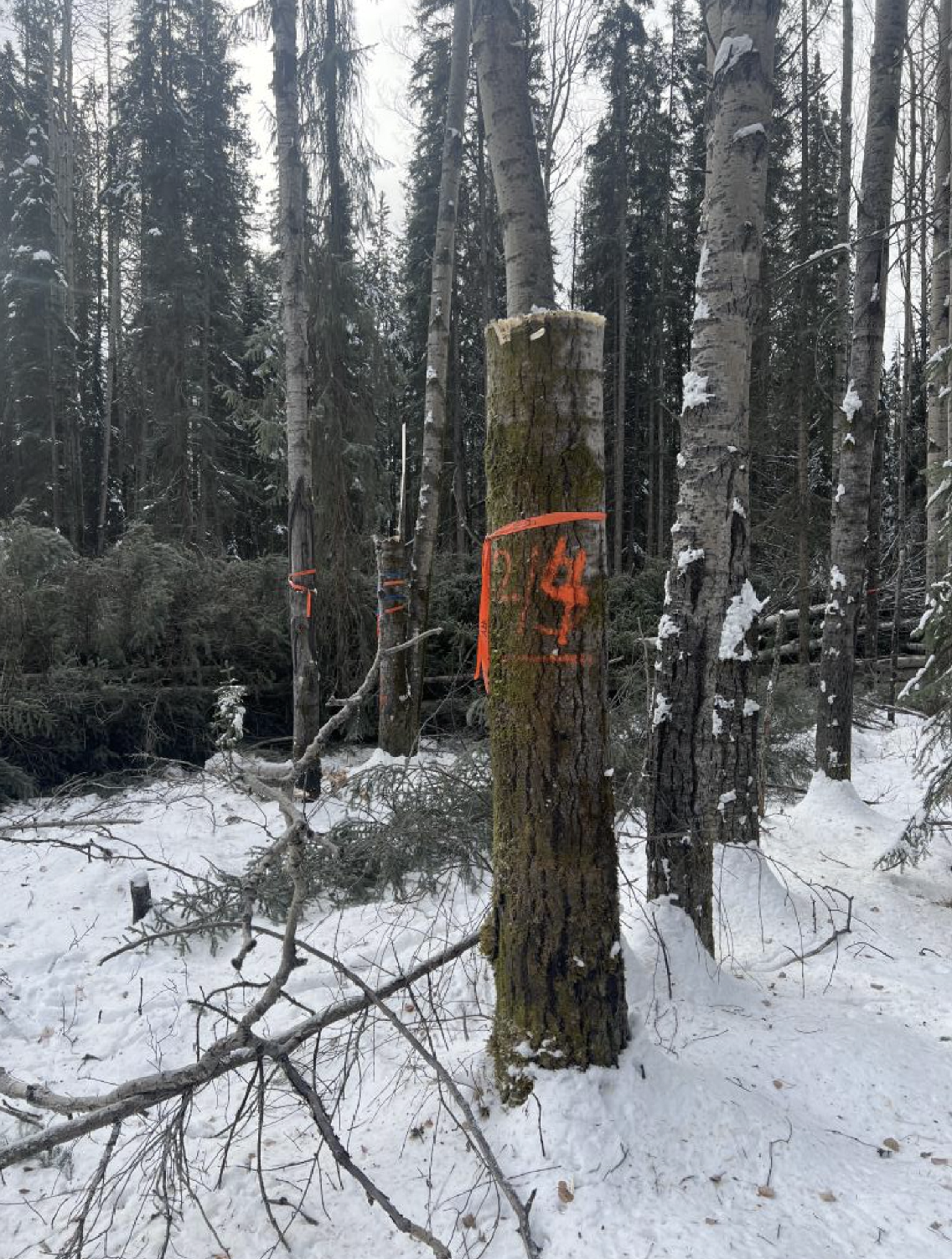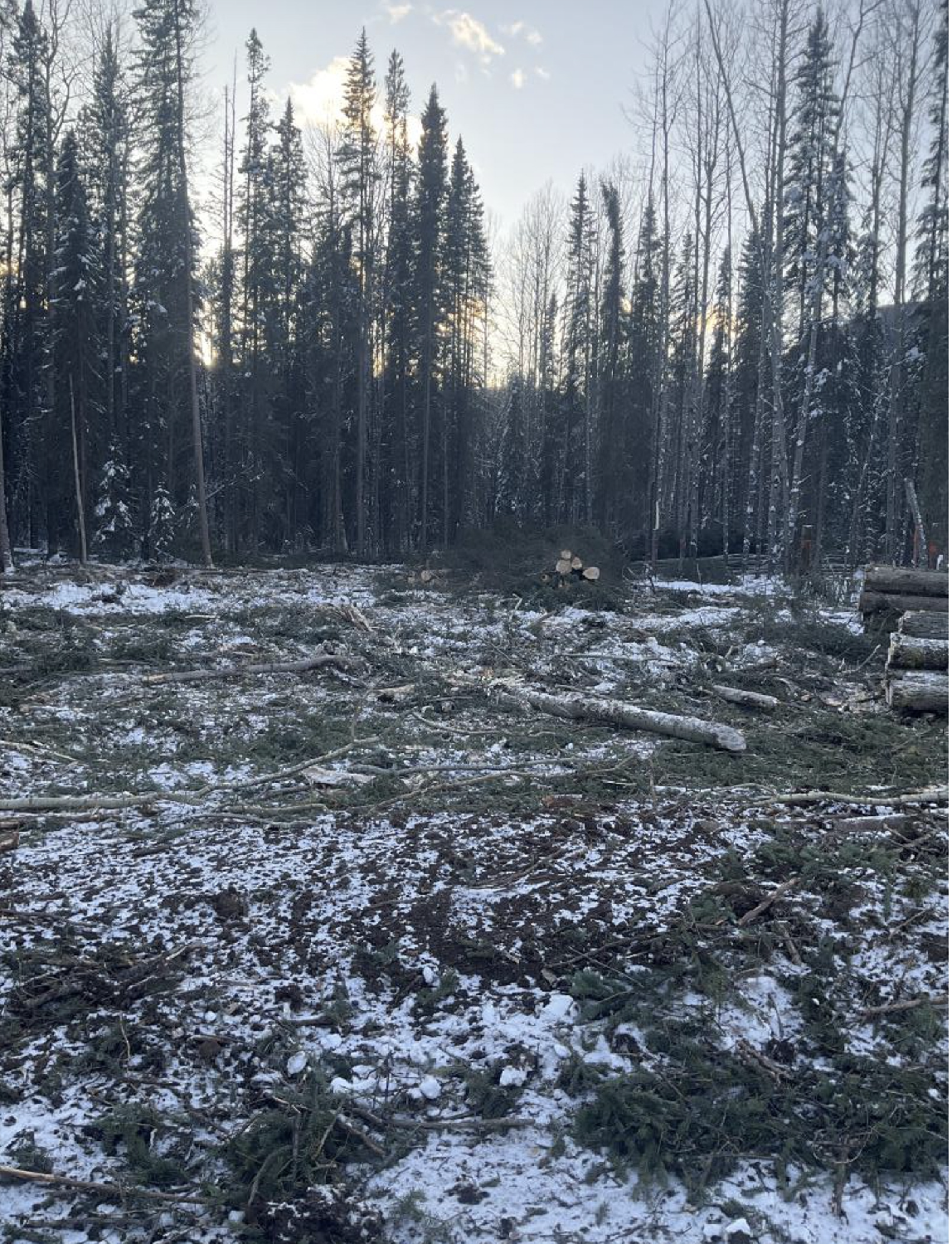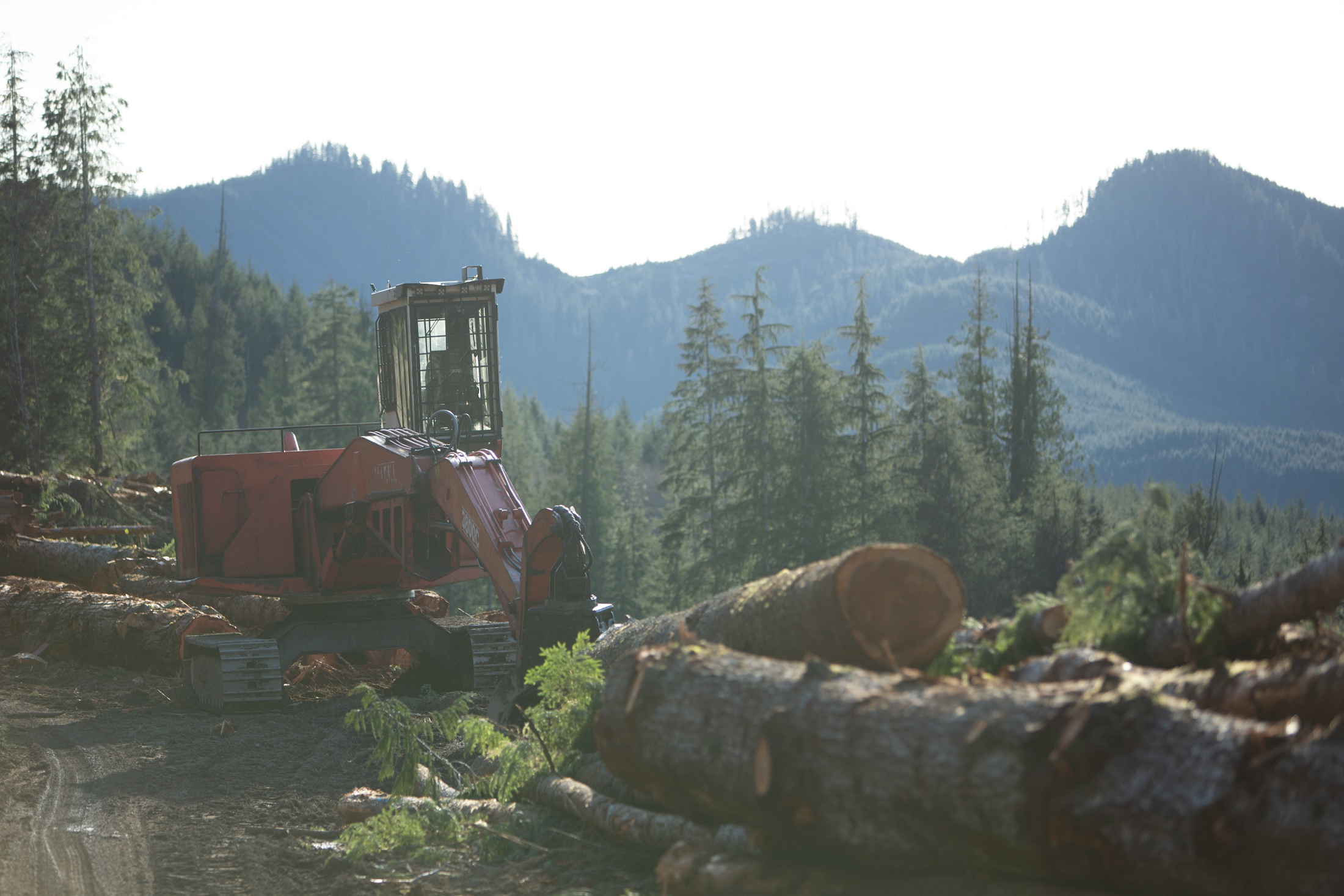
Ontario’s public service heads back to the office, meaning more traffic and emissions
For 15 years and counting, my commute from Mississauga to Toronto has been mired by...
Get the inside scoop on The Narwhal’s environment and climate reporting by signing up for our free newsletter.
In early November 2023, the operator of a feller buncher, a harvesting machine that grasps each tree trunk it cuts, was logging in a Canfor Corporation harvesting area east of Fort St. John, B.C.
The operator noticed fresh flagging tape marking the boundary of the harvesting area and saw it didn’t match up with the digital map showing where the forestry company was authorized to log.
The operator “thought about calling their supervisor but since there is no service in the block they would have had to drive 20 kilometres to reach cell service to call and they figured they did not want to waste the time,” the harvesting supervisor for Canfor’s Fort St. John division wrote in an email to B.C.’s Ministry of Forests, which The Narwhal obtained through a freedom of information request.
The operator logged 342 spruce trees and 38 pine trees — an estimated volume of 241 cubic metres of timber — from half a hectare of forest outside the area Canfor was authorized to cut, the supervisor reported.


The Canfor supervisor’s email did not specify why the operator felt they couldn’t wait to double check the boundary of the harvesting area before logging or why the flagging tape marked out an area larger than the approved block, but the case does offer a rare glimpse at allegations of unauthorized logging in B.C.
On about 170 occasions between January 2021 and July 2024, companies either cut, damaged or destroyed forest — or removed timber from the forest — without provincial authorization, according to B.C.’s compliance and enforcement database. (The database does not include incidents prior to 2021.)
Canfor, in some cases listed as Canadian Forest Products Ltd., was named in 22 incidents, while West Fraser Mills Ltd. was named in 13 incidents.
Canfor and West Fraser Mills both told The Narwhal incidents of unauthorized logging are rare and typically affect only a small area. But very few details are publicly available about these incidents and the B.C. government couldn’t say exactly how much forest has been lost. Neither would the ministry disclose any details about any action it took in cases where it alleged Canfor harvested without authorization, instead directing The Narwhal to file another freedom of information request.
“This is pretty typical and it exemplifies this fox in the hen house issue that we have in the province currently,” Tobyn Neame, a forest campaigner for the conservation organization the Wilderness Committee, said about the Canfor incident near Fort St. John.
“The logging industry gets away with a lot,” Neame said, “and the province doesn’t step in to monitor what they’re doing.”
In June, The Narwhal filed a freedom of information request asking for the total amount of unauthorized harvesting documented between Jan. 1, 2020 and June 10, 2024.
While the requested records have not yet been released, a government official said the B.C. Forests Ministry may not be able to provide a clear picture of how many hectares forestry companies have logged without authorization in recent years. That’s because the province doesn’t consistently track unauthorized logging by forestry companies, according to information the official shared with The Narwhal through the freedom of information process.
Some case files mention the volume of timber taken, while others quantify the area logged — and there’s no way to accurately convert volume to area or vice versa, the official explained.
With so little transparency, Neame said there’s no way to know the full impact of unauthorized logging in the province.
But “even if all of these transgressions are half of a hectare, there are still quite a few of them happening — way more than should be happening — and so that small amount adds up,” they warned.
“They shouldn’t happen in the first place,” Neame added. “We need a province that holds industry accountable for their actions.”
While the province publishes records related to corporate inspections under the Environmental Management Act, including details about incidents when companies pollute more than they are allowed to, the B.C. government releases scant information about offences under the Forest and Range Practices Act.
Most inspections since January 2021 found companies were in compliance with regulations and the outcome was listed as “compliant” in the government’s database.
In about 170 cases, though, the outcomes were listed as “alleged non-compliance — no action” or, most often, “alleged non-compliance — enforcement action,” which could mean the companies were fined for unauthorized logging or other offences. In almost a dozen cases, companies were simply issued warnings.
A spokesperson for the Ministry of Forests said enforcement actions for unauthorized logging depend on the severity of the offence and can include compliance notices, warning tickets, violation tickets, stop-work orders or financial penalties and, in severe cases, prosecution. The spokesperson explained compliance notices are letters that formally notify a company of “minor contraventions” but don’t levy a fine. Warning tickets are issued by law enforcement officers to formally document and notify a company of an infraction, but also don’t levy a fine. A violation ticket is an enforcement action that comes with a fine.
The type of enforcement action taken depends on the “gravity and magnitude” of the alleged offence, the inspection officer’s discretion and the environmental, social or economic impact, the spokesperson said.
Companies can face financial penalties up to $200 per cubic metre, up to $100,000 per hectare, or another amount based on a complicated calculation of stumpage — a fee paid when timber is harvested from Crown land in B.C. — and twice the market value and cost to re-plant the forest.
To date, the largest fine issued for unauthorized logging was for $1.2 million, the ministry spokesperson said in a statement. The case is being appealed and no further details can be released until all legal proceedings are completed, the spokesperson said.

In six of the 22 incidents involving Canfor, no action was taken, according to the compliance and enforcement database. In one case, the ministry gave the company a warning ticket. In the remaining 15 cases, the ministry took some sort of enforcement action, the database shows.
Spokespeople for Canfor and West Fraser Mills said the companies report unauthorized logging incidents to the government, investigate the incidents and take steps to prevent it from happening again.
“Such incidents are uncommon, typically with very low impact, and are subjected to our rigorous reporting requirements and continuous improvement systems,” Mina Laudan, Canfor’s vice-president of public affairs, said in an emailed statement.
In the wake of the November 2023 incident, for instance, the harvesting contractor reviewed “trespass awareness training” with their crew, according to the email the harvesting supervisor sent to a ministry official.
Joyce Wagenaar, director of communications for West Fraser Mills, said the company takes “resource stewardship very seriously,” but noted there are still rare occasions where mistakes are made.
“Unauthorized harvest occurred on less than 0.001 per cent of our total harvest boundary between Jan. 1, 2021 and July 2024,” she said.
In a statement, Travis Joern, director of communications for the Council of Forest Industries, which represents major forestry companies operating in the province, said the organization’s members “adhere to forest policies set by the provincial government.”
“Whenever there is a mistake, harvesting supervisors go in to review the incident and work with the team involved to ensure the workers are trained to ensure all activities meet the provincial requirements,” he said.
“B.C. has one of the most robust forest management frameworks in the world, and the record of those incidents provides some evidence that the province is actively tracking how much forest logging companies are harvesting,” Joern added.
A ministry official said the government would have to reopen each inspection record to see how much forest companies allegedly cut without authorization, but even then may not be able to provide a collective tally.
In a statement to The Narwhal, a spokesperson for the Ministry of Forests said “unauthorized logging of timber is a high priority.”
“Natural resource officers take all complaints, issues and incidents seriously and ensure the most impactful investigations are prioritized,” the spokesperson said, adding the ministry is “committed to transparency and openness and providing people with the information they need in a timely way.”
The spokesperson noted new legislation, which came into effect in April, allows the ministry to release more details about violations of the Forest and Ranges Practices Act.
“In some cases, records may contain sensitive information that cannot be made public in order to protect the rights and privacy of the parties involved,” the spokesperson added.
Documents would be added to the compliance and enforcement database “where feasible once the investigation and appeal periods are complete,” the statement also said.
In response to The Narwhal’s question about the lack of tracking of unauthorized logging, the spokesperson said “the ministry continues to review opportunities to improve data reporting.”
Neame said it comes down to a question of accountability.
“The current government promised the people of this province that they would increase transparency in how forests are managed in the province, and they haven’t done that,” Neame said.
Enbridge Gas will face Waterloo Region in a hearing before the Ontario Energy Board to renew an agreement that would allow the company to continue...
Continue reading
For 15 years and counting, my commute from Mississauga to Toronto has been mired by...

For our last weekly newsletter of the year, we wanted to share some highlights from...

The fossil fuel giant says its agreement to build pipelines without paying for the right...